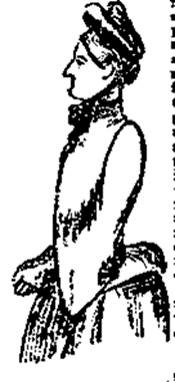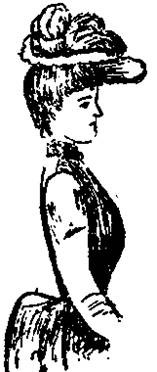This article has been transcribed from a copy of the Cardiff Times in the online collection of scanned Welsh newspapers 1804-1919 in the National Library of Wales, with grateful recognition of the free access accorded to all readers. Paragraph breaks have been introduced for easier reading.
Explanatory Notes
This article uses the word 'prig' in three senses given in the OED: (1): a petty thief (1567); (2) a person who is offensively punctilious and precise in speech or behaviour; a person who cultivates or affects supposedly correct views on culture, learning, or morals, which offend or bore others; a conceited or self-important and didactic person (1677); and (3) a person who is strict in nonconformist religious observance (1693; applied here to a religious hypocrite).
'Ogilvie' is
'He that giveth to the poor, lendeth to the Lord': 'He that hath pity upon the poor lendeth unto the LORD; and that which he hath given will he pay him again': Proverbs 19:17.
Pecksniffian: resembling Mr. Pecksniff in Charles Dickens's Martin Chuzzlewit
Uriah Heep is a sycophantic hypocrite in Dickens’s David Copperfield, who frequently claims to be '’umble'.
F. C. Phillips is Francis Charles Phillips (1849-1921), British army officer, actor, theatre-manager, dramatist, barrister, journalist, short story writer and novelist, who, in addition to over a dozen plays, wrote over forty novels which shocked the critics.
The song 'He wears a nice blue ribbon' is a parody of the American song, 'She wore a yellow ribbon', the yellow ribbon being associated with those waiting for a family member or loved one to return from army service. Then as now, a blue ribbon was awarded for the highest achievement in a given field and was also worn by members of certain temperance societies.
'far from the madding crowd' is from Thomas Grey, 'Elegy Written in a Country Churchyard' l. 73, and provided the title of Far from the Madding Crowd by Thomas Hardy, published in 1874.
'Bunthorne School' derives from Bunthorne, the principal male character in Gilbert and Sullivan's comic opera
'Bob up serenely' was a number sung by Ashley in the comic opera Olivette, with words by H. B. Farnie and music by Edmond Audran (1842-1901). The opera first appeared in Paris as Les Noces d'Olivette (1879), and speedily found its way to London, where it ran for more than a year at the Strand theatre (1880-1881). —— David Skilton
There is an idyl of ancient and uncertain date which states, with more accuracy than delicacy, that
'He wot prigs wot isn't hizzen,
When he's cotched goes off to prison.'
Now there can be no doubt that the 'prig' mentioned in the lines quoted was a person of felonious habits. That his counterpart still exists the police-court records too sadly prove. He is a person to be avoided - especially in crowds — for his principles are shady, and his fingers nimble.
But there are other prigs to be dealt with in the world, and if they are not dishonest they are quite as objectionable as the purloiner of other people's property.
You meet them in almost every walk of life, and you cannot get rid of them. No amount of snubbing has the least effect upon them, for like the man in the song, they 'bob up serenely' after the most severe castigation at the hands of their more sensible comrades.
A prig is described by

Juvenile felonious prig.
They are most superior people, these prigs, and seem to be entirely out of their element in such a commonplace world as the one we live in, They want what a smart but irreverent American called 'a little tin heaven' of their own, where there would be no ordinary people to jar upon their superior nerves, and where nothing but what was quite the correct thing would be allowed to have an existence.
To the prig such a state of affairs would be elysium; to a rational prig it would be purgatory. But there is nothing rational about the genus prig.

Hates prigs.
Who is there does not know the meek and mild Pecksniffian humbug, who is apparently so steeped in religious ardour that his friends with a turn for facetiousness occasionally suggest that wings will some day begin to sprout from the top of his shoulders?
He is a perfect piece of hypocrisy is the religious prig. He adorns his ordinary conversation with Scripture text and references, and when engaged in a commercial transa[c]tion puts in a. few words of spiritual comfort as he charges you five per cent. extra on the off-chance of having to wait, an extra month for his money. He seldom, if ever, makes a bad debt, and not unfrequently retires from business at an early age with a snug competency. On his way to the bank, with a bag full of filthy lucre which he pretends to despise, he gives with much ostentation a half-penny to a passing beggar, adding to a friend who sees the action, 'He that giveth to the poor, lendeth to the Lord.' A few moments after he is unloading his well-lined money-bag on to the counter of the bank.

Female religious prig.
A peculiarity of the religious prig is his humility and the sad and resigned expression upon his features. How he manages to keep it up I do not know; but there it is at all times and in all seasons. It indicates that, compared to him, Uriah Heep, of immortal memory, was a specimen of arrogant braggart, and the modest school-girl, not yet out of her teens, a forward minx, who would do credit as the heroine of a novel by F. C. Phillips.
To misquote the song—
'He wears a nice blue ribbon in his coat,
La di da!'
and goes in strongly for Band of Hope and other temperance demonstrations. Yet I have seen him in propriâ personâ indulging in a 'modest refresher' in an out-o'-the-way hostelry far from the madding crowd.
Taken all round the religious prig is a contemptible mockery of manhood and a disgrace to his species. Only slightly less objectionable, if more amusing, is the lady, generally of moderately youthful years, who is what is popularly known as 'affected.' She is a very superior being, and indulges in an existence of the dolce far niente [sweet idleness] order.
She never does anything what [sic] ordinary people do if she can possibly help it. and she sneers at everything and everybody till one is apt to wonder why she does not go into a nunnery or retreat to ensure perfect immunity from contamination with less high-toned mortals than her conceited self.
She affects the latest style of conversation and drawls her words out as though they cost so much each, and she is afraid of using too many at once. When she is not really ill she pretends she is, and her nerves are a perfect nuisance to her friends and a regular anxiety to her favourite doctor. For all the pleasures of ordinary girls she has a contempt, and tells you that love and 'all such frivolous nonsense really has no interest for her.' Yet when she finds her ideal man she falls over head and ears in love, and makes a bigger 'silly' of herself than any common-sense girl would dare to do for fear of being considered fast or forward. I have often wondered whether this specimen of priggism reforms after marriage[.] I hope so, for if she does not her husband will hardly find his life worth living.

Society prig.
Prigism now and then pervades a nation, and no greater proof of this can be adduced than the recent wave of æstheticism which passed over our island of England but a few years ago, aestheticism in its purest art sense has a distinct and appreciable val[u]e; but the sham article as supplied by Mr Oscar Wilde and his tribe of blind followers was but the outcome and result that prigs of art (with a capital A) who, failing to make positions, genuinely had recourse to the poses and absurdity of the Bunthorne School of aestheticism. No one but a born prig would waste his time posing before a lily and sensible men and women could have but little sympathy with a set of people who invented and used such phrases as 'too utterly too too,['] and 'too awfully utter.' Yet for a time these people reigned and had their admirers and followers. There is, I fancy, a tendency to prigism all through the world at the present day, and I cannot but think that the men and women who do wonderful things at great risk to themselves are more or less allied to the genus prig, for nothing conduces to prigism sooner than a sudden leap from obscurity to notoriety.
Last modified 20 April 2022